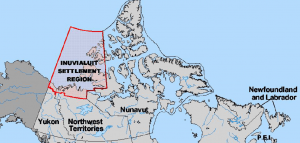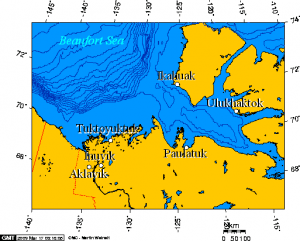Children are tech savvy. This statement should come as no surprise to, well, anyone. Their…

Digital Library North: Development of a Model Digital Library Platform for Northern Canada
Digital libraries provide organized, inclusive and open access to quality information sources. They are multifaceted and complex structures that offer a wide range and variety of information resources and services and reduce spatial, temporal and access barriers.
One of the key challenges associated with information access in Canada’s north is the lack of a proper digital information infrastructure to provide relevant and reliable access to information resources.
An example of this kind of information gap can be found in the Inuvialuit Settlement Region (ISR) of the Northwest Territories, where access to relevant, digital information poses a number of challenges for the communities. We have proposed a multifaceted project to investigate the development of a model digital library platform to accommodate the information needs of the communities with the ISR region. The proposed study will focus on the ISR region of the Northwest Territories, comprising six communities: Paulatuk, Ulukhaktok, Sachs Harbour, Tuktoyaktuk, Inuvik and Aklavik, and 91,000 square kilometers of land.


There are a number of significant information access and delivery challenges in the ISR.
First, there is no coherent information infrastructure to provide seamless, efficient, and remote access to the resources available throughout the region. Specifically, there is no unified digital access platform for the geographically dispersed physical resources.
Second, there is a lack of organization standards to represent, access, and retrieve resources of all formats.
Third, little research has been undertaken on information needs and information-seeking behaviours of ISR community users to inform a design for effective delivery of information services and resources. The proposed project will address these challenges. This project aims to bridge the digital divide currently experienced by ISR community members.
The research is contextualized in six key research areas, namely: digital libraries, information needs, behaviour and uses, cultural heritage information, metadata, multilingual user interfaces, and digital library evaluation.
This project aims to address the following key objectives:
- Investigate and identify the information needs and information seeking behaviour of community members in the ISR. This will include the use of a broad range of techniques for gathering data, including environmental scan of library and information resources available in physical and digital formats, assessing information needs of various members of the communities and identifying and partnership with stakeholder organizations.
- Develop a digital library of information resources. This will include a range of scholarly, cultural heritage and daily life information resources.
- Explore appropriate methodologies for treatment of cultural heritage information. Specifically, methodologies that focus and draw upon community partnerships, with the Inuvialuit Cultural Resource Centre (ICRC) functioning as the focal point.
- Create a culturally appropriate metadata framework as a basis for resource description and discovery. This will involve a detailed exploration of previous metadata frameworks adopted by existing digital initiatives and the development of a new metadata scheme appropriate for the proposed digital library.
- Develop requirements for multilingual user interfaces that support the dominant languages. This stage of the project aims to develop an example of a prototype interface that demonstrates the ways in which the digital content will be accessed using more than one language.
- Conduct a user-centred evaluation of the digital library. The user-centred and usability evaluation of this digital library is key to its acceptance and success. The evaluation will involve a various members of the community, including students, teachers, librarians and members of the general public.
- Develop a sustainability strategy for the digital library to ensure long-term access to digital information. To ensure the long term access to digital information, we will develop a sustainability plan that draws upon the active involvement of various individuals and organizations to keep the context and infrastructure up to date relevant.
- Provide training in information management to local project participants. Given the nature and scope of this project, training is an essential component of the project for the long term maintenance and responsiveness to the communities information needs.
This project will make contribution to the development of a digital library platform and a community-driven metadata standard to support information organization, access and retrieval, which can function as a model for northern, remote, and/or rural regions, eventually forming a pan-Canadian system.
The project will have wider social benefit by contributing to:
a) the enhancement of Canada’s digital content advantage, especially for a sector of society that currently experiences barriers to participate in digital economy;
b) the engagement with partners in the North in exploring opportunities to impact lives and cultures in a positive way, and
c) the development of a digital library infrastructure to support widespread dissemination of digital content and media.
For more information about this research, please visit Digital Library North.
Ali Shiri is a Professor in the School of Library and Information Studies at the University of Alberta. Dinesh Rathi is an Associate Professor in the School of Library and Information Studies at the University of Alberta. The authors wish to acknowledge the Social Sciences and Humanities Research Council of Canada (SSHRC) for providing the funding support for this project.
